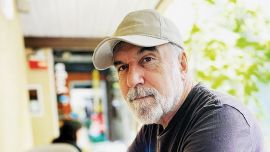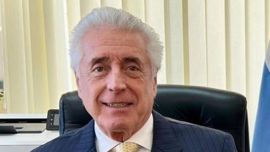A seemingly all-powerful Javier Milei has taken Argentina, and a great part of the world, by storm.
The La Libertad Avanza leader’s political rockstardom has catapulted him to become one of the best-known leaders of the global “new right” movement, to the point where he’s noted that, along with US president-elect Donald Trump, he is one of the leading exponents of the “ideas of freedom” across the world. A freakish outsider who considers himself an “anarcho-capitalist” libertarian, Argentina’s President is apparently solidifying a political structure — with the all-important leadership of ‘El Jefe,’ his sister Karina, who happens to be his chief-of-staff —that intends to lay the ground for an era of socio-cultural hegemony.
Much like Kirchnerism marked the first decade and a half of the 20th century. “Vamos por todo,” which roughly translates into “we want it all,” was the catchphrase with which Cristina Fernández de Kirchner kicked off her second presidency, riding the emotional wave of the grieving period after the death of her husband and political leader, Néstor Kirchner, which helped her win re-election. Cristina took 54 percent of the vote in the first round in 2011, the second-widest margin in Argentina’s modern history only behind Juan Domingo Perón in 1973. It was also the same zeitgeist feeling that impelled Mauricio Macri and his followers when they handily defeated Fernández de Kirchner in the 2017 midterm elections, apparently having begun to tame inflation while output bounced. Despite Cristina’s phenomenal comeback story in the aftermath of the Macri implosion, the Alberto Fernández administration never managed to engineer its own “vamos por todo” moment, a fact that speaks to the political and economic fragility of his government. How long will the libertarian dream last?
The Kirchnerite dream for total hegemony started off with Néstor’s decision not to run for re-election, while at the peak of his popularity. Three polls cited in a 2006 story in Clarín gave then-president Kirchner more than 50 percent voting intention, followed by then-first lady Cristina Fernández de Kirchner hovering above 40 percent. Way behind were Roberto Lavagna, Elisa Carrió, and Mauricio Macri at about 10 percent each. Fernández de Kirchner won the 2007 presidential election in the first round with 45 percent of the votes, ‘Lilita’ Carrió came in second with 23 percent, and Lavagna completed the podium with 17 percent. The expectation was that the economy would continue to grow at “Chinese rates” – near 10 percent a year – and that after Cristina’s two terms, Néstor would come back in to complete a 16-year cycle. Flying close to the sun, they began to publish fake inflation figures from the INDEC national statistics bureau, entered into a serious conflict with the agricultural sector that resulted in an internal break with then-vice-president Julio Cobos, and pushed the conflict with the media sector to the brink with their “war” with Clarín. Losing the midterms in 2009 with Néstor as their candidate in the Buenos Aires Province, the Kirchneites were overtaken by outsider Francisco De Narváez, and were looking shaky for the presidential bout scheduled for 2011. But as mentioned above, Néstor’s surprise death in October 2010 changed everything, allowing Cristina to construct a major electoral victory.
While Kirchnerism pushed several noble causes that consolidated its popularity, including their renewed focus on human rights abuses during the 1976-1983 military dictatorship, social assistance through AUH (“Asignación universal por hijo”) payment and passing the same-sex marriage bill, to name a few, their ascent to a position of absolute political dominance made them greedy and victims of hubris. Their culture wars exacerbated polarisation, creating a growing sector of the population that identified itself as anti-Kirchnerite. They faked statistics and covered up flagrant cases of corruption. But the ultimate failure was their incapacity to adapt to a new global political paradigm, particularly after the 2008 subprime crisis in the United States and the ensuing 2010 EU debt crisis. By 2015, they had put in place currency controls known as the “cepo” and devalued the currency, defaulted on the foreign debt in the middle of another battle (this time with US Judge Thomas Griessa and the so-called “vulture funds” led by billionaire Paul Singer), and expropriated national energy company YPF. Argentina’s international allies were part of what in the United States could be seen as the new “axis of evil,” including Venezuela, Cuba, Russia and China. The death of AMIA special prosecutor Alberto Nisman, after having accused Cristina of forming an immunity pact with Iran was a deadly blow for the Kirchnerites, who lost the 2015 elections by a tiny margin and left office in disgrace.
Is that the mirror in which Milei and Sister Karina should look for their reflection? Kirchnerism obviously remains hugely influential and Cristina made a comeback as vice-president after Macri’s failed presidency. Even now, she is emerging as the major bastion of the opposition against Milei. Yet, Cristina’s elevated disapproval ratings make it impossible for her to aim for the presidency (she’s expected to run for the Chamber of Deputies in Buenos Aires Province next year —), while the pan-Peronist front around her seems more united by rejection of Milei than shared political spirit. Attempts to question Fernández de Kirchner’s authority are silenced brutally – just ask Alberto Fernández, or Axel Kicillof.
Macri, who did experience his own “vamos por todo” moment in 2017, is equally as unpalatable as a presidential candidate, given massive disapproval ratings, though he remains hugely influential within his space. Yet he’s suffered the defection of his main political asset, Patricia Bullrich, who jumped ship to the Milei bandwagon and is now one of his fiercest critics (typical Pato). At the same time, the former president worked diligently to dynamite his successor in the mayorship of Buenos Aires City presidential hopes. It’s unclear what Horacio Rodríguez Larreta will do in the near future, but his days as a heavyweight contender seem to be behind him after a lacklustre performance in 2023, when he didn’t even make it past the PASO primaries. Furthermore, Macri’s coalition has finally imploded, wth Milei’s La Libertad Avanza trying to absorb the constituency of its former core, the ex-president’s PRO party. While the engineer from calabrese descent has proven an astute political player, it is difficult to see how they could dispute a position of power with Milei these days.
We’re early into the Milei experiment. But Javier and Karina, along with star political advisor Santiago Caputo — together the “iron triangle” behind every decision— are already imagining the “Milei era,” which should last at least eight years and include control of the Casa Rosada, together with Buenos Aires City and Buenos Aires Province. If Milei has adequately interpreted the times, structuring a fail-proof economic programme that would guarantee his popularity for at least two terms would allow him to continue to wage a global culture war against “the left” that would probably become ingrained in the minds of a large part of Argentine society.
But we are nowhere near there yet.



















Comments